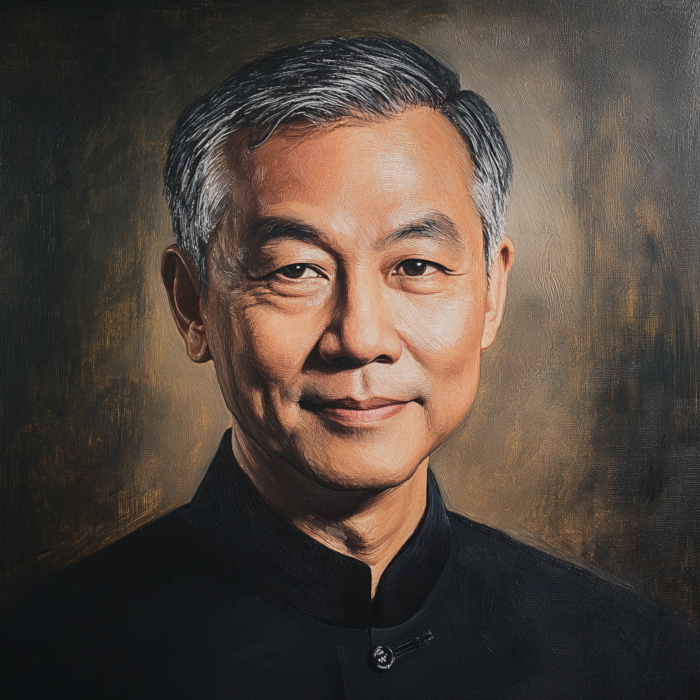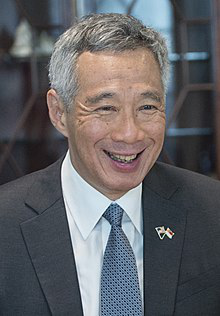


Lee Hsien Loong (born February 10, 1952) is a Singaporean politician and the current Prime Minister of Singapore, a position he has held since 2004. He is the son of Singapore’s founding Prime Minister, Lee Kuan Yew, and has played a key role in shaping Singapore’s political and economic landscape for decades. As leader of the People's Action Party (PAP), the dominant political party in Singapore, Lee Hsien Loong has overseen the country's continued economic growth, managed its complex social dynamics, and navigated its position in an increasingly competitive global environment.
Birth and Family Background: Lee Hsien Loong was born in Singapore on February 10, 1952, to Lee Kuan Yew and Kwa Geok Choo. His father, Lee Kuan Yew, was Singapore's first prime minister and is widely credited with transforming the island nation from a struggling former British colony into one of the most prosperous and modern countries in the world. Growing up in a prominent political family, Lee Hsien Loong was exposed to politics and public service from a young age.
Education: Lee Hsien Loong is highly educated, having attended several prestigious institutions. He attended the Catholic High School and National Junior College in Singapore before receiving a scholarship to study in the United Kingdom. He studied mathematics at Trinity College, Cambridge, where he graduated with first-class honors. He also earned a diploma in computer science from the University of Cambridge. Later, he obtained a Master of Public Administration from the John F. Kennedy School of Government at Harvard University.
Political Debut: In 1984, Lee Hsien Loong entered politics as a member of the People's Action Party (PAP), which was co-founded by his father, Lee Kuan Yew, and has been the ruling party of Singapore since the country's independence. Lee Hsien Loong was elected as a Member of Parliament (MP) for Teck Ghee in the general election that year, and he quickly rose through the ranks of the party and government.
Ministerial Positions: Over the years, Lee held several key ministerial positions, including Minister of Trade and Industry, Minister of Finance, and Deputy Prime Minister. His tenure as Minister of Trade and Industry (1986–1992) and Minister of Finance (2001–2007) was marked by his focus on strengthening Singapore’s economy, fostering innovation, and attracting foreign investment.
As Deputy Prime Minister (1990–2004), Lee played a significant role in managing Singapore's economy, overseeing economic reforms, and preparing the country to adapt to the changing global economy. His strong focus on fiscal discipline and economic modernization helped cement Singapore’s position as a leading global financial hub.
Becoming Prime Minister: In August 2004, Lee Hsien Loong succeeded Goh Chok Tong as the third Prime Minister of Singapore. His transition to leadership was seen as part of a carefully planned succession, as Singapore’s leadership has traditionally emphasized continuity and stability. Lee’s assumption of the prime ministership marked the first change in leadership in Singapore since his father, Lee Kuan Yew, stepped down in 1990.
Economic Growth and Innovation: During his tenure as prime minister, Lee has focused on maintaining Singapore's economic competitiveness while ensuring sustainable growth. He has overseen efforts to diversify Singapore's economy by fostering innovation, promoting research and development, and positioning the country as a leader in fields such as biotechnology, information technology, and financial services.
Lee has also supported policies to strengthen Singapore's global trade links and has been a vocal advocate for free trade and multilateralism. Under his leadership, Singapore has negotiated and signed several free trade agreements, including the Comprehensive and Progressive Agreement for Trans-Pacific Partnership (CPTPP) and the Regional Comprehensive Economic Partnership (RCEP).
Social Policies and Inclusivity: One of the hallmarks of Lee Hsien Loong's leadership has been his efforts to address social issues and maintain harmony in Singapore’s multicultural society. He has overseen reforms in areas such as housing, healthcare, and education to ensure that all Singaporeans benefit from the country's prosperity. He has also addressed the challenges posed by an aging population, implementing policies to support the elderly and improve healthcare infrastructure.
Lee has promoted inclusivity by addressing issues of inequality and promoting social mobility, although his government has also faced criticism over the cost of living and income inequality. In response, his administration has introduced measures such as the progressive wage model and support for low-income families.
Political Landscape: As the leader of the PAP, Lee has maintained the party’s dominance in Singapore’s political system, which is characterized by a strong one-party rule. However, in recent years, there has been a growing opposition presence in Parliament, reflecting evolving political dynamics. Lee has emphasized the importance of engaging with younger Singaporeans and encouraging greater political participation.
COVID-19 Pandemic Response: Lee Hsien Loong’s leadership was tested during the COVID-19 pandemic, which significantly impacted Singapore's economy and daily life. His government implemented strict public health measures, including travel restrictions, widespread testing, contact tracing, and social distancing protocols. Singapore's relatively low COVID-19 mortality rate and efficient vaccination campaign have been praised globally, although the economic impact of the pandemic posed challenges.
Foreign Policy and Diplomacy: On the international stage, Lee Hsien Loong has strengthened Singapore’s relationships with major powers, including the United States, China, and neighboring Southeast Asian countries. He has maintained a pragmatic foreign policy, positioning Singapore as a neutral and stable actor in a region marked by strategic competition, particularly between the U.S. and China. His government has worked to balance relations with both powers, promoting open trade and regional cooperation.
Leadership Style: Lee Hsien Loong is known for his pragmatic and technocratic approach to governance, much like his father, Lee Kuan Yew. He is often seen as a calm, thoughtful, and measured leader who focuses on policy details and long-term planning. Lee has also shown an openness to engage with the public through social media and public forums, seeking to connect with younger generations.
Challenges and Criticisms: While Lee Hsien Loong has been praised for his leadership, particularly in terms of economic management and maintaining Singapore’s stability, his government has faced criticism over issues such as political freedoms, media control, and the cost of living. Singapore’s political system, dominated by the PAP, has been criticized for its lack of opposition voices, although the country has made gradual moves toward greater political participation.
Succession Planning: As of 2024, Lee Hsien Loong has indicated plans to step down in the coming years, though the timing of his retirement has been extended due to challenges such as the COVID-19 pandemic. His succession has been a carefully managed process, and Deputy Prime Minister Lawrence Wong has been identified as a potential successor, ensuring continuity in leadership.
Family: Lee Hsien Loong is married to Ho Ching, a prominent businesswoman who served as the CEO of Temasek Holdings, Singapore’s sovereign wealth fund, until 2021. The couple has four children, although one of their children passed away in infancy. Lee is known for his private nature and is respected for maintaining a relatively low public profile when it comes to his personal life, despite being part of Singapore’s most prominent political family.
Health: Lee Hsien Loong has faced health challenges, including a battle with lymphoma in the 1990s, from which he fully recovered after treatment. In 2015, he underwent surgery for prostate cancer, which was also successful. Despite these health issues, he has remained active in his role as prime minister.

We use cookies
We use cookies and other tracking technologies to improve your browsing experience on our website, to show you personalized content and targeted ads, to analyze our website traffic, and to understand where our visitors are coming from. Privacy Policy.